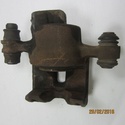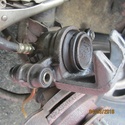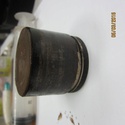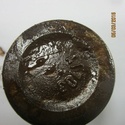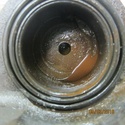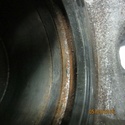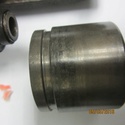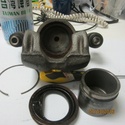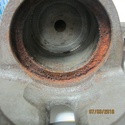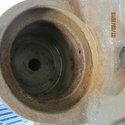Originally Posted By: Tegger
Originally Posted By: Ducked
AFAIK there was no brake fluid ahead of the seal before I put it there, because the seal was still, like, sealing.
I think that doesn't say much for any alleged penetrative properties of brake fluid. If brake fluid had penetrative properties, would it not have been present on the outside of the hydraulic seal if rust were present? Or is this thought also too hypothetical?
No. Its thought to be too bloody silly.
OF COURSE brake fluid is penetrative. Unlike grease, its a liquid, which flows and is subject to capilliary forces.
Saying it isn't, because the seal keeps it in is like saying hot engine oil isn't penetrative, because seals keep IT in.
Or penetrating oil isn't penetrative, because if it was you'd never be able to keep it in the bottle.
(Most) bullets bounce off (most) tanks, but they penetrate uniforms with distressing ease.
Its a RELATIVE TERM.
Originally Posted By: Tegger
Originally Posted By: Ducked
Dunno if its done any good (the main resistance is probably rust behind the seal,
Rust on the piston itself. Rust on the bore will have little to no effect. THIS is what sticks-up a piston:

Sure. I didn't say different.
Originally Posted By: Tegger
You can go on a voyage of discovery for yourself and see if your piston is similarly decorated.
That's the plan, and thanks for the permission, though it does seem at odds with you not thinking I should work on my car.
Originally Posted By: Ducked
I can't see why it would do any harm.
Originally Posted By: Tegger
No harm, but it did make an ineffectual mess for you, which silicone grease (or red rubber-grease) would not have done.
I don't know if it was effective, though it was certainly easier, cheaper, and less messy than grease would have been. Perhaps optimally I'd have done both.
However, to justify your original "I don't think you should do mechanical work on your car" it'd have to be definitely damaging and/or dangerous. Phooey.
Originally Posted By: Ducked
AFAIK there was no brake fluid ahead of the seal before I put it there, because the seal was still, like, sealing.
I think that doesn't say much for any alleged penetrative properties of brake fluid. If brake fluid had penetrative properties, would it not have been present on the outside of the hydraulic seal if rust were present? Or is this thought also too hypothetical?
No. Its thought to be too bloody silly.
OF COURSE brake fluid is penetrative. Unlike grease, its a liquid, which flows and is subject to capilliary forces.
Saying it isn't, because the seal keeps it in is like saying hot engine oil isn't penetrative, because seals keep IT in.
Or penetrating oil isn't penetrative, because if it was you'd never be able to keep it in the bottle.
(Most) bullets bounce off (most) tanks, but they penetrate uniforms with distressing ease.
Its a RELATIVE TERM.
Originally Posted By: Tegger
Originally Posted By: Ducked
Dunno if its done any good (the main resistance is probably rust behind the seal,
Rust on the piston itself. Rust on the bore will have little to no effect. THIS is what sticks-up a piston:

Sure. I didn't say different.
Originally Posted By: Tegger
You can go on a voyage of discovery for yourself and see if your piston is similarly decorated.
That's the plan, and thanks for the permission, though it does seem at odds with you not thinking I should work on my car.
Originally Posted By: Ducked
I can't see why it would do any harm.
Originally Posted By: Tegger
No harm, but it did make an ineffectual mess for you, which silicone grease (or red rubber-grease) would not have done.
I don't know if it was effective, though it was certainly easier, cheaper, and less messy than grease would have been. Perhaps optimally I'd have done both.
However, to justify your original "I don't think you should do mechanical work on your car" it'd have to be definitely damaging and/or dangerous. Phooey.


